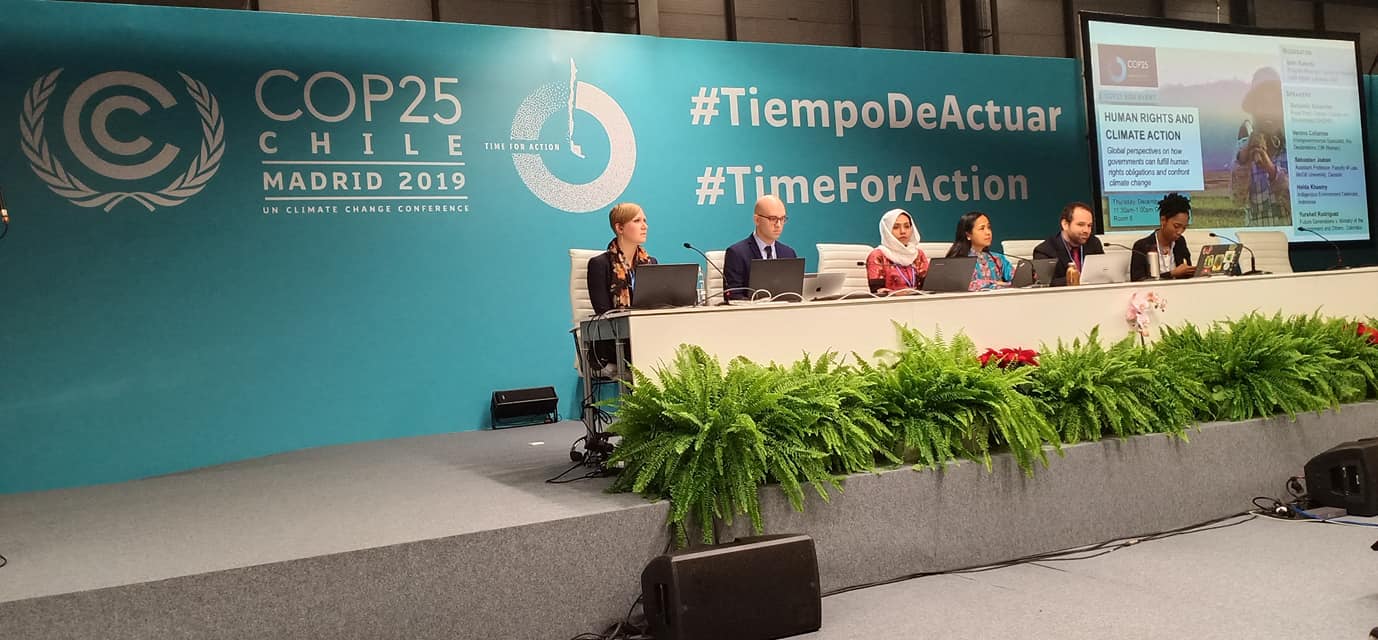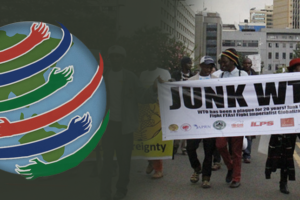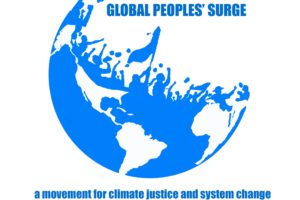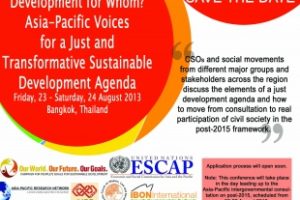IBON International Update #5
Climate Justice
6 December 2019, Madrid, Spain – Against the backdrop of uncertain global geopolitics and intensifying protests gripping the host country Chile, the two-week annual climate talks of the United Nations Framework Conference on Climate Change (UNFCCC) officially opened on 2 December in Madrid, Spain, presided by Chilean Minister of Environment Carolina Schmidt.
Government representatives attending the 25th Conference of Parties of the UNFCCC (COP25) and related meetings are convening with the Subsidiary Body for Implementation (SBI) and the Subsidiary Body for Scientific and Technological Advice (SBSTA) of the Convention to decide on a few unfinished agenda as well as discussions to agree on the rules for the implementation of Paris Agreement following the decisions adopted in Katowice, Poland in 2018.
Developed and developing countries are expected to lock horns on a number of contentious issues and unfinished agenda items such as the proposed stocktaking of the pre-2020 commitments made by developed countries; review of the Warsaw International Mechanism to deal with loss and damage due to climate change; rules for the implementation of Article 6 of the Paris Agreement; and climate finance.
IBON International, along with other civil society organizations and movements, has clarified their positions regarding these issues in a sign-on statement.
‘Transformational approach needed’ – UN Secretary General
At the opening ceremony on 2 December, the UN Secretary General (UNSG) Antonio Guterres stressed the need for a “transformational” approach to climate change.
Affirming the findings of climate science, he reiterated that “to limit global temperature rise to the necessary 1.5 degrees by the end of this century, we must reduce emissions by 45 per cent from 2010 levels by 2030, and we must achieve climate neutrality by 2050.”
The UNSG called for “ambition in mitigation, ambition in adaptation, and ambition in finance”. He stressed, “We should ensure that at least $100 billion a year are available to developing countries for mitigation and adaptation and take into account their legitimate expectations to have the resources necessary to build resilience and for disaster response and recovery.”
The UNSG expressed disappointment as coal power plants continue to be planned and built in large numbers and that countries are planning to produce fossil fuels over the next decade at over double the level that is consistent with keeping temperature rise to 1.5 degrees Celsius.
The UNSG emphasized the need for rapid and deep changes “in the way we do business, how we generate power, how we build cities, how we move, and how we feed the world”.
The UNSG said further, “We need to make progress on carbon pricing, shift taxation from income to carbon, ensure no new coal plants are built after 2020, and end the allocation of taxpayers’ money for perverse fossil fuel subsidies.”
He also stressed that transition to a green economy needs to be just: “… one that recognizes the need to care for the future of negatively impacted workers, in terms of new jobs, lifelong education, and social safety nets.”
The UNSG added that G20 countries, “which represent more than three-quarters of global emissions” need to do more by “enhancing (their) national determined contributions in 2020 under the Paris Agreement, presenting a carbon neutrality strategy for 2050, and embarking on the de carbonization” of their economies.
US participation in climate talks challenged by developing countries
In November 2019, the US Department of State said, “The US will continue to participate in ongoing climate change negotiations and meetings—such as COP25—to ensure a level playing field that protects US interests.”
In Madrid, developing countries challenged the participation of the United States in the deliberations under the Kyoto Protocol and the Paris Agreement given that the US is not a party to the Kyoto Protocol, while it has also begun the process of withdrawing from the Paris Agreement which will take effect in November 2020.
Last month, civil society criticized the US along the same lines for continuing to sit on the Green Climate Fund (GCF) Board to decide on its policies and speak about which developing country can receive funds or not. This is despite that, up to now, it has not fulfilled its pledge of USD 3 billion to the GCF.
Closing pre-Paris Agreement implementation gaps
Like-minded developing countries also expressed dismay over developed countries’ refusal to honor their climate obligations. They called for a mandate at the COP25 for a two-year work program undert the SBI to close the pre-2020 implementation gaps under the Convention and the Kyoto Protocol.
The G77 of developing countries called out the withdrawal from the Paris Agreement of “a developed State Party that is responsible for emitting almost one-fifth of current annual global emissions and historically responsible for almost one-third of cumulative historical global emissions”.
Major developed countries also continued to drag their feet with regard to the 2012 Doha Amendment of the Kyoto Protocol. The 2012 Doha Amendment of the Kyoto Protocol committed developed country parties to implement emission reductions that would be at least 18 per cent below 1990 levels, and to revisit their emission reduction commitments by the end of 2014, with a view to increasing ambition.
Developing and least developed countries demand that developed countries act expeditiously to close the pre-2020 implementation gaps to ensure that developed countries do not shift the responsibilities to developing countries after 2020.
Deputy Executive Secretary of the UNFCCC Ovais Sarmand in his address said, “The pre-2020 period and what was supposed to be accomplished is all about building trust and confidence in the process, among the Parties with the Secretariat, and with the people who are expecting great action to address one of the most important threats to our existence.” Given that “we are about 2 to 3 weeks away from entering 2020”, we need a much stronger, higher level of ambition, and build on what has been achieved and assess what has not been achieved.
Enabling Action and Support on the Warsaw International Mechanism
The UNFCCC’s Subsidiary Bodies conducted informal consultations for the decision on the review of the Warsaw International Mechanism for Loss and Damage associated with Climate Change Impacts (WIM) from December 3 to 5.
Developing countries under the G77 proposed enhancing the links between the WIM and other constituted bodies of the COP and emphasized the need to build on partnerships with institutions, disaster risk and reduction communities, and civil society for building capacity, technical assistance, and data gathering. They also stressed the need for a finance facility to provide funding for loss and damage.
Least Developing Countries added the need for a technology transfer facility and an expert group to advance the work on enabling action and support.
Civil society organizations monitoring the COP negotiations maintain the need for establishing a separate loss and damage finance facility through new resources to channel rapid-response finance to where it is needed, facilitate increased availability of finance for slow-onset events, improve the access for poor and vulnerable communities, and support capacity-building and knowledge-sharing.
Disputes over Adaptation Fund Board membership rules
Developing and developed countries continued to wrestle over adaptation fund (AF) board membership rules revisions. The AF currently serves the Kyoto Protocol and the Paris Agreement. In 2019 in Katowice, Poland, it was decided that the AF will exclusively serve the Paris Agreement and shall no longer serve Kyoto Protocol once the share of proceeds under Article 6 of the PA becomes available.
Developed countries demand enhanced representation of developed countries in the AF Board and should reflect the source of financing for the AF.
The G77, referencing a previous decision adopted in Katowice, contended that both developing and developed countries are eligible to serve the AF board and saw no need for any substantive revisions in the composition of the fund.
The issue will be further threshed out in the remaining days of COP.
For IBON International, the governance of climate policymaking needs to break with the tradition of the usual dominance and monopoly of developed countries that we have seen in other global development policymaking bodies and forums. Furthermore, climate policymaking needs to be democratized for meaningful and democratic participation of grassroots communities and sectors in all relevant stages, from planning, implementation, to monitoring and evaluation.
Developed countries sideline post-2020 long-term climate finance discussions
Developed countries oppose discussions on post-2020 long-term climate finance arguing that the mandate for long-term climate finance (LTF) should end in 2020 and any further considerations on the matter should take place under the Paris Agreement.
Developing countries contended that neither LTF nor the mobilization of USD 100 billion annually would end with 2020. Developed countries had to continue taking the lead in the provision of finance. Given that the climate finance needs in developing countries exceeded billions, there was a need to set a new collective goal on finance and the LTF was well placed to discuss the goal.
IBON International has reiterated that at the heart of climate finance is the issue of justice. Climate finance is an obligation of developed countries, and this obligation, according to data trends, is not being met by those most responsible for the climate crisis. Funds are not new and additional as some developed countries continue to count their climate funds as part of their Official Development Assistance (ODA). Between 2014 and 2017, the share of climate-related ODA reported to OECD DAC was around 20-21%, the vast majority of which was counted towards donor commitments to increase aid to 0.7% of GNI.
The Achilles’ heel of the Paris Agreement: Article 6
Dominating the climate talks in Madrid is the debate on the rules for the implementation of the Article 6 of the Paris Agreement. While at the COP24 in Katowice, Poland in 2018, Parties reached an agreement on the so-called Paris Rulebook but failed to do so for a text on Article 6.
While the text of the Paris Agreement is not up for discussion, getting the rules right on the implementation of Article 6 is paramount to the integrity of the Paris Agreement. Getting these rules right is important for fighting climate change: depending on the outcome of the negotiation, Article 6 could help the world avoid dangerous levels of global warming or let countries off the hook from making meaningful emissions cuts.
Article 6.1 states that Parties can “choose to pursue voluntary cooperation in the implementation of their nationally-determined contributions (NDCs)” while Article 6.2 allows Parties to engage “on a voluntary basis in cooperative approaches that involve the use of internationally transferred mitigation outcomes (ITMOs) towards their NDCs”.
ITMOs allow the possibility of the establishment of an international carbon market despite almost a decade of lack of consensus on the issue among Parties in the negotiations.
Developed countries support such a mechanism while developing countries stand in opposition because they allow for developed countries to pay for mitigation actions to be undertaken by developing countries with the resulting emission reductions expropriated as the emission reductions of developed countries.
IBON International will be monitoring the discussions on Article 6 in the following days. We believe that market-based solutions such as offsets and carbon markets only provide a lifeline to the fossil fuel industry and further delay the most needed domestic changes that need to take place in developed countries. Carbon offset projects have been associated with grave violations of peoples’ rights and ecological harm.
Kyoto-era projects must not be used to achieve mitigation targets of the Paris Agreement regime from 2020 onwards while projects in the pipeline of the Kyoto mechanisms must be able to demonstrate environmental integrity, compatibility with human rights obligations, and robust environmental and social safeguards.
Thousands gather for climate justice march
On December 6, Friday, outside the UN climate talks, demonstrators from all sections of society thronged the streets of Madrid to call for more ambitious climate policy. Simultaneous protests were also being held in the Chilean capital of Santiago.
IBON International participated in the half a million strong-march. Holding the banner “Stop the Attacks against People and the Planet”, IBON International aimed to highlight the role of environmental defenders amid the climate emergency and the increasing dangers that they face because of their work.
“When we talk about the current climate emergency, it’s not just about the state of the environment but also the state of the people especially those in the frontline defending their livelihoods and natural resources from corporate plunder. We want governments at the UN to also take into account the role of environmental defenders in reaching a more ambitious climate policy and the need to defend the defenders from increasing attacks and killings,” said Triana Kurnia Wardani of Serikat Perempuan Indonesia (SERUNI). # (Lorelei S. Covero and Ivan Phell Enrile, Madrid)



![[WEBINAR] Reclaim Our Lands, Forests, and Rivers: A CSO Review of Kenya’s Amended Climate Change Act](https://iboninternational.org/wp-content/uploads/2023/10/CLIMATE-JUSTICE-final-300x200.jpg)
